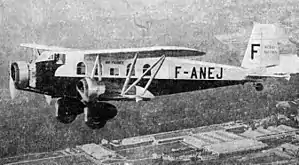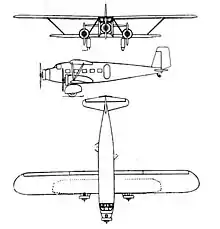Bréguet 393T
The Bréguet 390T, 392T and 393T were a family of French propeller-driven sesquiplane airliners of the mid-1930s.
| Bréguet 393T | |
|---|---|
 | |
| Role | Airliner |
| Manufacturer | Bréguet |
| First flight | February 1931 |
| Introduction | July 1934 |
| Primary user | Air France |
| Number built | 9 |
Development
The Bréguet 390T family were large three-engine sesquiplanes of all-metal construction with a fixed tailwheel undercarriage.
Operational history
The newly constituted Air France operated six 393Ts, plus the sole 392T prototype that it purchased from Breguet to use as a cargo plane. The aircraft were originally deployed on the Toulouse-Casablanca route and later on the Natal-Buenos Aires route. Towards the end of their careers, all remaining 393Ts were recalled to Paris and used on short routes between Paris and nearby European destinations.
Variants
- 390T
- First prototype, powered by Gnome-Rhône 5Kd radial engines. One aircraft built, destroyed in crash early in test programme.
- 391T
- Second prototype, similar to 390T.
- 392T
- Freighter version powered by Hispano-Suiza 9Qc radial engines, one built.
- 393T
- Definitive production version with Gnome-Rhône 7Kd radial engines, six built.
Specifications (393T)

Breguet 393T 3-view drawing from L'Aerophile February 1934
General characteristics
- Crew: two pilots
- Capacity: eight passengers
- Length: 14.76 m (48 ft 5 in)
- Wingspan: 21.71 m (71 ft 3 in)
- Wing area: 66.5 m2 (715 sq ft)
- Empty weight: 3,966 kg (8,743 lb)
- Gross weight: 6,000 kg (13,228 lb)
- Powerplant: 3 × Gnome-Rhône 7Kd , 261 kW (350 hp) each
Performance
- Maximum speed: 249 km/h (155 mph, 135 kn)
- Range: 975 km (606 mi, 527 nmi)
- Service ceiling: 5,850 m (19,200 ft)
References
| Wikimedia Commons has media related to Bréguet 393T. |
Citations
Bibliography
- Taylor, Michael J. H. (1989). Jane's Encyclopedia of Aviation. London: Studio Editions. p. 199.
- World Aircraft Information Files. London: Bright Star Publishing. pp. File 890 Sheet 81.
This article is issued from Wikipedia. The text is licensed under Creative Commons - Attribution - Sharealike. Additional terms may apply for the media files.